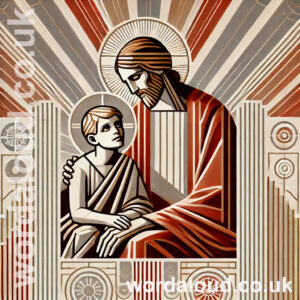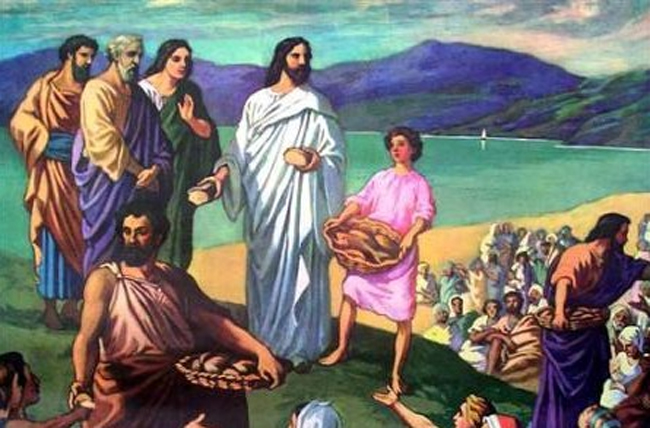Christian Art | Jesus Christ Is The Living Lord | Ascension
Office Of Readings | Week 19, Wednesday, Ordinary Time | A Reading From The Discourses Of Saint Augustine On The Psalms | Come, Let Us Go Up To The Mountain Of The Lord
‘Oh come, let us go up to the mountain of the Lord.’
Augustine’s meditation draws on the conviction that the Church stands as both the fulfilment of Israel’s hope and the visible sign of God’s promises realised in history. His opening phrase, As we have heard, so also have we seen, comes directly from Psalm 48 (/Vg. 47), a psalm celebrating Zion as the city of God. In its original Old Testament setting, the psalm rejoices in Jerusalem’s security and God’s protection; Augustine applies it to the Church, understood as the true and enduring ‘city of the Lord of hosts’.
Saint Augustine contrasts two stages of revelation: first ‘hearing’ through prophecy, then ‘seeing’ through the Gospel. The early Church, in Augustine’s reading, has the privilege of experiencing what ancient Israel only anticipated. Prophetic statements such as All the kings of the earth will adore him, all the nations will serve him (Psalm 72 (/Vg. 71)) are no longer future hopes but present realities, visible in the global spread of Christianity.
Augustine layers multiple psalm references to reinforce the continuity of prophecy and fulfilment. Be exalted above the heavens, O God, and your glory above all the earth (Psalm 57 (/Vg. 56)) now applies to Christ risen and enthroned. The Passion prophecies of Psalm 22 (/Vg. 21) — the piercing of hands and feet, the counting of bones, and the casting of lots for garments — are directly linked to the crucifixion narratives of the Gospels. Augustine invites the listener to recognise the one who was ‘despised when he walked on the earth’ as the one who now reigns from heaven.
In citing Hear, O daughter, and see, and forget your people and your father’s house (Psalm 45 (/Vg. 44)), Augustine interprets the Church as the bride of Christ, called from among the Gentiles. The order of the verbs — hear first, see later — supports his theological point: the Gentile nations heard the Gospel through apostolic preaching before seeing the fulfilment of the prophecies they had never previously known.
A subtle reversal emerges in his observation that those to whom the prophets were originally sent (the Jewish people) ‘remained behind’, in the sense of possessing Scripture without recognising its fulfilment, while those who were not sent prophets (the Gentiles) heard, obeyed, and understood. This reading mirrors Paul’s argument in Romans 9–11 about the surprising dynamics of God’s call.
Finally, Augustine warns against division by quoting Christ’s caution, ‘See, here is Christ; see, he is there’ (Matthew 24:23). The secure foundation of the Church is grounded in unity, not in factions. When he insists, ‘God has made this city firm for ever’ (Psalm 48 (/Vg. 47)), Augustine is making an ecclesiological claim: the Church’s stability is guaranteed by divine action, not human effort, and cannot be overthrown despite the changing fortunes of the world.
Augustine weaves psalmody, prophecy and Gospel together into a single vision of the Church as the living, visible continuation of God’s covenantal promises — no longer confined to a single city or people, but extended to all nations under the reign of Christ.

A Reading From The Discourses Of Saint Augustine On The Psalms | Come, Let Us Go Up To The Mountain Of The Lord
As we have heard, so also have we seen. Truly blessed Church! You have both heard and seen. You have heard the promises, and you see their fulfilment; you have heard in prophecy, and you see in the Gospel. Yes, all that has now been brought to completion was prophesied in times past. Raise up your eyes, then, and cast your gaze around the world. See God’s people, your heritage, spread to the ends of the earth. See the Scripture now fulfilled: All the kings of the earth will adore him, all the nations will serve him. See fulfilled what has been said: Be exalted above the heavens, O God, and your glory above all the earth. See him whose hands and feet were pierced by nails, whose bones were numbered as they hung upon the wood, and for whose garments they cast lots. See him reigning, whom they saw hanging upon the cross; see him enthroned in heaven, whom they despised when he walked on the earth. See the word fulfilled: All the ends of the earth shall turn to the Lord, and all nations shall worship in his sight. See all this and shout with joy: As we have heard, so also have we seen.
Deservedly then the Church is itself called from among the Gentiles: Hear, O daughter, and see, and forget your people and your father’s house. Hear and see. First you hear what you do not see; later you will see what you have heard. For he says: A people I did not know served me, as soon as they heard me they obeyed. If they obeyed as soon as they heard, it follows that they did not see. What then of the passage: Those who were not told of him will see, and they who have not heard will understand? Those to whom the prophets were not sent were the first to hear and understand the prophets, whereas those who at first did not hear them were astonished when they heard them later. Those to whom the prophets were sent remained behind, possessing the books of Scripture but not understanding the truth, possessing the tables of the law but not keeping their inheritance. As we have heard, so also have we seen also applies to us.
In the city of the Lord of hosts, in the city of our God, that is where we have heard; there too we have seen. God has made this city firm for ever. No one should say boastfully: See, here is Christ; see, he is there. Such a claim only leads to factions. But God has promised unity. The kings were gathered together in unity, not scattered through schisms. Yet perhaps that city which had gained possession of the world will at some time be overthrown? No, God has made it firm for ever. If God has made its foundation firm for ever, how can you fear that this foundation may collapse?
Christian Prayer With Jesus Christ
Lord Jesus Christ,
You are the fulfilment of the promises once spoken through the prophets.
You have gathered peoples from every nation into one flock,
And made your Church a city founded for ever on your love.
Open our ears to hear your word with faith,
Open our eyes to see your works with joy,
And keep us steadfast in the unity you have willed.
Defend your Church from division and falsehood,
That we may walk together to the mountain of the Lord,
Where you reign with the Father and the Holy Spirit,
One God, for ever and ever. Amen.
Glossary Of Christian Terms
City of God – Augustine’s image for the Church as the spiritual Jerusalem, the dwelling place of God among his people. Not to be confused with his later work The City of God; here it means the universal Church.
Gentiles – A biblical term for nations other than Israel. In the New Testament, it refers to non-Jewish peoples brought into God’s covenant through Christ.
Hebrew (/Vg.) numbering – A way of identifying psalms by both the Hebrew (Masoretic) numbering and the Latin Vulgate numbering, since they mostly differ (e.g., Psalm 48 Hebrew = Psalm 47 Vulgate).
Inheritance – In biblical language, the blessings and promises of God, originally given to Israel and now shared with the Church.
Prophecy – A message from God, often foretelling future events, given through inspired speakers in Scripture. Augustine reads the psalms and prophets as pointing to Christ.
Schism – A formal split or division in the Church’s unity, often caused by false teaching or refusal of legitimate authority.
Unity – The oneness of faith, worship, and governance in the Church, rooted in Christ and sustained by the Holy Spirit.
Zion – The hill in Jerusalem where the Temple stood; symbolically, the dwelling place of God and, in Christian interpretation, the Church itself.








